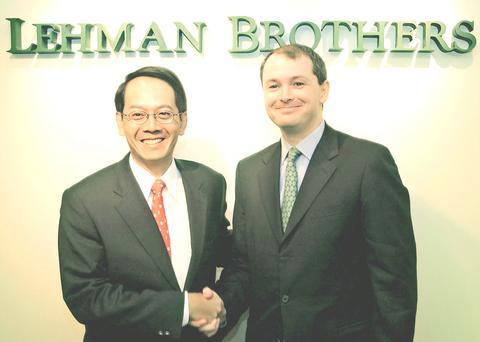Lehman Brothers Holdings Inc formally opened its Taipei branch yesterday, setting its eyes on the nation's lucrative capital markets, company officials at the fourth-biggest US securities firm said.
Lehman said Taiwan is certain to attract more foreign investment because there's an increasing number of equity and equity-linked deals developing here, following the abolishment of the qualified foreign institution investor program early last month.

PHOTO: AP
In addition, "The gradual economic turnaround here will spur investment demand," said Albert Weng (
"We expect more Taiwanese companies to raise funds overseas. The demand for issuing corporate bonds and depository receipts will be very strong next year," he said.
Taiwanese firms have raised more than US$13 billion overseas since July. The company said another US$3.5 billion of deals are in the pipeline.
Lehman Brothers foresees more acquisition and mergers locally.
"There will be more mergers next year. It's a unavoidable trend to boost economic scale as most local financial companies lag far behind their Asian rivals," Weng said.
The firm is very bullish about Taiwan and expects GDP growth of 6 percent next year.
``China is the primary driver of Taiwan growth,'' Rob Subbaraman, the firm's senior economist for Asia, said in a statement.
"Taiwan is arguably benefiting more now than any other country in the world from the rapid growth and opening of the Chinese economy,'' he said.
The Directorate General of Budget, Accounting and Statistics, said in August that Taiwan is expected to see economic growth of 3.53 percent this year and 4.5 percent next year.
Lehman Brothers first set foot in Taiwan in 1988 by setting up a representative office. By opening a branch here, it can now trade in all listed securities on the Taiwan Stock Exchange and the over-the-counter market. The company also offers research services and has recruited 10 analysts with special focuses on Taiwan's technology, finance and telecommunications industries, said Tim Throsby, the firm's head of equities in Asia.

To many, Tatu City on the outskirts of Nairobi looks like a success. The first city entirely built by a private company to be operational in east Africa, with about 25,000 people living and working there, it accounts for about two-thirds of all foreign investment in Kenya. Its low-tax status has attracted more than 100 businesses including Heineken, coffee brand Dormans, and the biggest call-center and cold-chain transport firms in the region. However, to some local politicians, Tatu City has looked more like a target for extortion. A parade of governors have demanded land worth millions of dollars in exchange

Hong Kong authorities ramped up sales of the local dollar as the greenback’s slide threatened the foreign-exchange peg. The Hong Kong Monetary Authority (HKMA) sold a record HK$60.5 billion (US$7.8 billion) of the city’s currency, according to an alert sent on its Bloomberg page yesterday in Asia, after it tested the upper end of its trading band. That added to the HK$56.1 billion of sales versus the greenback since Friday. The rapid intervention signals efforts from the city’s authorities to limit the local currency’s moves within its HK$7.75 to HK$7.85 per US dollar trading band. Heavy sales of the local dollar by

Taiwan Semiconductor Manufacturing Co’s (TSMC, 台積電) revenue jumped 48 percent last month, underscoring how electronics firms scrambled to acquire essential components before global tariffs took effect. The main chipmaker for Apple Inc and Nvidia Corp reported monthly sales of NT$349.6 billion (US$11.6 billion). That compares with the average analysts’ estimate for a 38 percent rise in second-quarter revenue. US President Donald Trump’s trade war is prompting economists to retool GDP forecasts worldwide, casting doubt over the outlook for everything from iPhone demand to computing and datacenter construction. However, TSMC — a barometer for global tech spending given its central role in the

The Financial Supervisory Commission (FSC) yesterday met with some of the nation’s largest insurance companies as a skyrocketing New Taiwan dollar piles pressure on their hundreds of billions of dollars in US bond investments. The commission has asked some life insurance firms, among the biggest Asian holders of US debt, to discuss how the rapidly strengthening NT dollar has impacted their operations, people familiar with the matter said. The meeting took place as the NT dollar jumped as much as 5 percent yesterday, its biggest intraday gain in more than three decades. The local currency surged as exporters rushed to